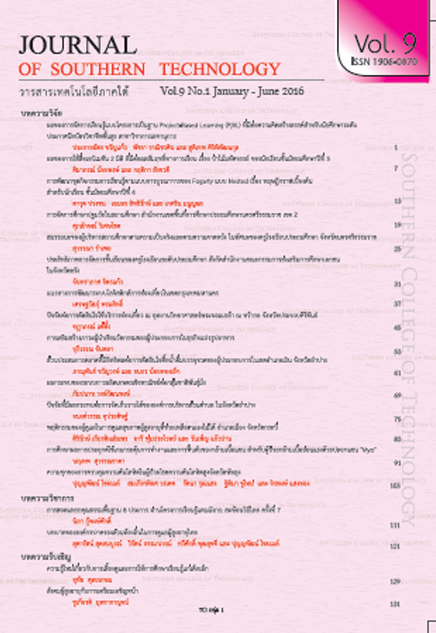ผลของวัฏจักรการเรียนรู้แบบ 7 ขั้น ที่มีต่อผลสัมฤทธิ์ ทางการเรียนวิทยาศาสตร์ ของนักเรียนชั้นประถมศึกษาปีที่ 2
Main Article Content
Abstract
ผลการวิจัยพบว่า (1) ผลสัมฤทธิ์ทางการเรียนรู้วิทยาศาสตร์ของนักเรียนหลังจากการเรียนแบบวัฏจักรการเรียนรู้ 7 ขั้น สูงกว่านักเรียนที่เรียนด้วยวิธีสอนตามปกติอย่างมีนัยสำคัญทางสถิติที่ระดับ .001 (t=7.342, P≤.001) ซึ่งเป็นไปตามสมมติฐานที่ตั้งไว้ และ (2) นักเรียนกลุ่มทดลองที่ได้รับการจัดการเรียนรู้แบบวัฏจักรการเรียนรู้ 7 ขั้น มีคะแนนของการประมาณค่าเฉลี่ยผลสัมฤทธิ์ทางการเรียนวิทยาศาสตร์ที่ระดับความเชื่อมั่น 95 เปอร์เซ็นต์ อยู่ระหว่างร้อยละ 70.40-75.80 ในขณะที่นักเรียนกลุ่มควบคุมที่ได้รับการสอนตามปกติ มีคะแนนเฉลี่ยอยู่ระหว่างร้อยละ 58.96-63.70
Effects of 7E Learning Cycle on Science Achievement of Grade 2 Students
The purposes of this research were: (1) to compare the science learning achievement of grade 2 students using 7E learning Cycle and traditional teaching method, and (2) to estimate the average of the science learning achievement of grade 2 students using 7E learning Cycle and traditional teaching method. The sample was grade 2 students of Krabi Primary Educational Service Area Office, during the second semester of the academic year 2014. Two experimental and control groups with 30 students were selected based on group matching determined from the mean and standard deviation of the achievement of Science subject. The instruments used for gathering data were; (1) 13 plans of 7E learning Cycle, (2) 13 conventional plans and (3) a 30 items multiple-choice test for achievement test with discriminating powers ranging from 0.21-0.86 and a reliability of .75. The data were analyzed to determined mean, standard deviation, t-test of learning achievement.
The research findings showed that: (1) The learning achievement of students taught by learning cycle 7E was significantly higher than students taught by the traditional teaching method at .001 level (t=7.342, P≤.001). (2) The mean scores of the experimental group taught by learning Cycle 7E estimated with the confidence level of 95 percent was between 70.40 to 75.80 percent, while the control group taught by traditional teaching method was between 58.96 to 63.70 percent.
Article Details
-
Authors must agree to the journal publication rules and allow the editors to edit the manuscripts for publication.
-
Author’s right belongs to the author but Journal of Southern Technology holds the right of first publication and thus allow readers to use the article for the purpose of education but not commercial.

